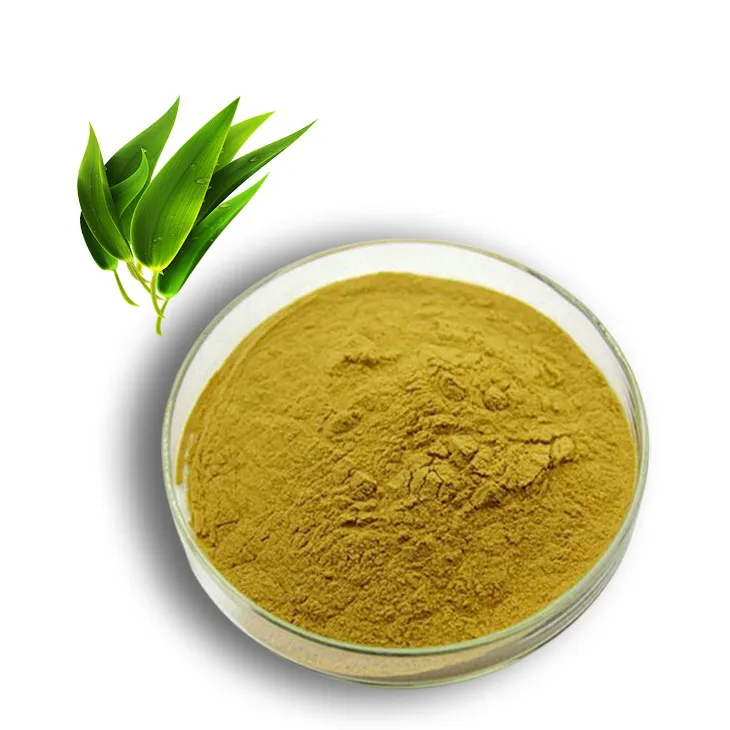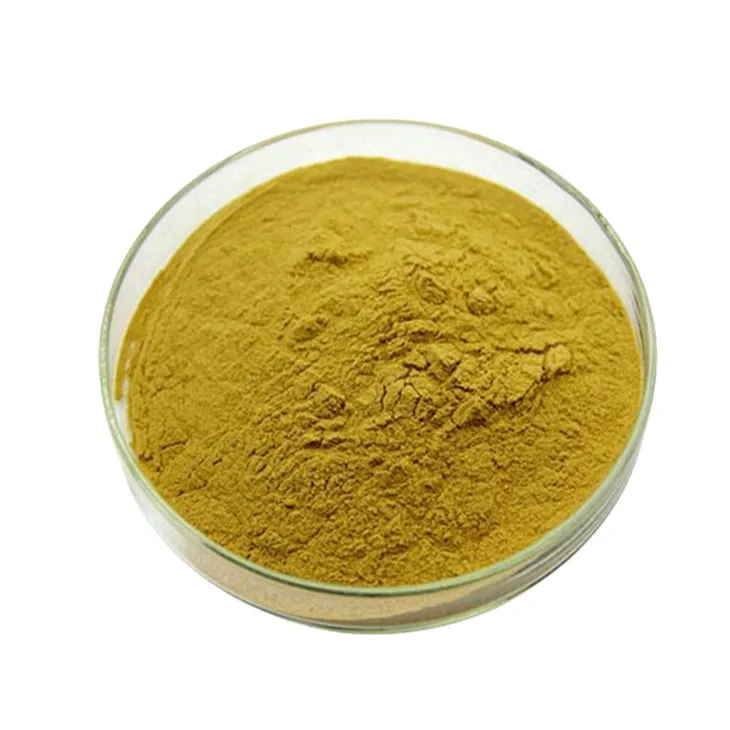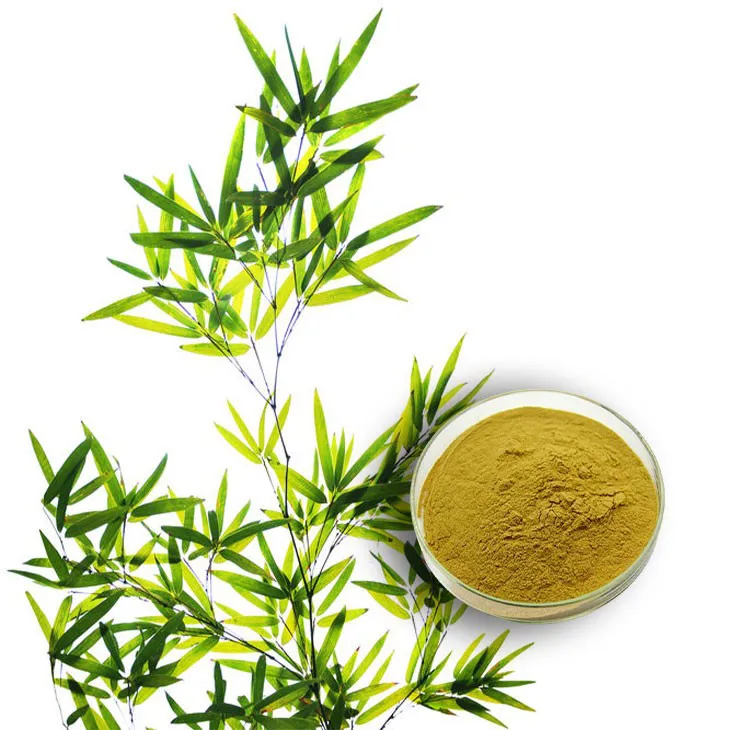- 0086-571-85302990
- sales@greenskybio.com
Five Efficacy of Bamboo Leaf Extract + Dosage, Side Effects
2024-11-11

I. Introduction
Bamboo, a ubiquitous plant in many parts of the world, has long been recognized not only for its structural and aesthetic uses but also for its potential health benefits. Bamboo Leaf extract, in particular, is a rich source of various bioactive components that have been the subject of increasing scientific research in recent years. This article aims to explore five of its notable efficacy, as well as discuss proper dosage and potential side effects, providing valuable information for those interested in natural remedies and health - enhancing substances.

II. The Five Efficacy of Bamboo Leaf extract
1. Antioxidant Activity
Antioxidants are crucial for maintaining good health as they help combat oxidative stress in the body. Oxidative stress is caused by an imbalance between the production of free radicals and the body's ability to neutralize them with antioxidants. Bamboo Leaf extract contains flavonoids, phenolic acids, and other compounds that have significant antioxidant properties.
Flavonoids such as orientin and isoorientin present in bamboo leaf extract can scavenge free radicals, preventing them from causing damage to cells. This antioxidant activity is associated with a reduced risk of chronic diseases such as heart disease, cancer, and neurodegenerative disorders. For example, by neutralizing free radicals in the blood vessels, it may help prevent the oxidation of low - density lipoprotein (LDL) cholesterol, which is a key step in the development of atherosclerosis.
2. Anti - inflammatory Effects
Inflammation is a natural response of the body to injury or infection, but chronic inflammation can lead to various health problems. Bamboo leaf extract has been shown to possess anti - inflammatory properties.
The bioactive components in the extract can modulate the body's inflammatory response pathways. They can inhibit the production of pro - inflammatory cytokines such as interleukin - 6 (IL - 6) and tumor necrosis factor - alpha (TNF - α). This makes it potentially useful in the treatment or prevention of inflammatory conditions like arthritis, where excessive inflammation in the joints can cause pain and disability. Additionally, it may also play a role in reducing inflammation in the digestive tract, potentially alleviating symptoms of inflammatory bowel diseases.
3. Hypoglycemic Activity
For individuals with diabetes or those at risk of developing diabetes, maintaining proper blood sugar levels is crucial. Bamboo leaf extract has been found to have hypoglycemic effects.
It may act on multiple mechanisms to regulate blood glucose. One possible way is by enhancing insulin sensitivity in the body. Insulin is a hormone that helps cells take up glucose from the bloodstream. By improving insulin sensitivity, cells can more effectively utilize glucose, thus reducing blood sugar levels. Additionally, some components in the bamboo leaf extract may also inhibit certain enzymes involved in carbohydrate digestion, thereby slowing down the absorption of glucose from the diet and preventing rapid spikes in blood sugar.
4. Antimicrobial Properties
In the era of increasing antibiotic resistance, the search for new antimicrobial agents is of great importance. Bamboo leaf extract has demonstrated antimicrobial activity against a variety of microorganisms.
Studies have shown that it can inhibit the growth of bacteria, fungi, and viruses. For bacteria, it may disrupt their cell membranes or interfere with their metabolic processes. In the case of fungi, it can prevent spore germination and mycelial growth. Regarding viruses, although the exact mechanisms are still being investigated, it has shown potential in inhibiting viral replication. This antimicrobial property of bamboo leaf extract makes it a promising candidate for the development of natural antimicrobial products, which could be used in areas such as food preservation, wound care, and the prevention of infectious diseases.
5. Cardiovascular Protection
The heart and blood vessels play a vital role in maintaining overall health, and bamboo leaf extract offers several benefits in this regard.
As mentioned earlier, its antioxidant activity helps prevent the oxidation of LDL cholesterol, which is a major risk factor for cardiovascular diseases. Additionally, it may also have a positive effect on blood pressure regulation. Some components in the extract may help relax blood vessels, reducing peripheral resistance and thus lowering blood pressure. Moreover, by reducing inflammation in the blood vessels and improving endothelial function (the function of the inner lining of blood vessels), it can contribute to overall cardiovascular health, reducing the risk of heart attacks, strokes, and other cardiovascular events.

III. Dosage of Bamboo Leaf Extract
The appropriate dosage of bamboo leaf extract can vary depending on several factors, including the form of the extract (e.g., powder, capsule, tincture), the intended use, and individual health conditions.
When used as a dietary supplement, a general recommended dosage for dried bamboo leaf extract is typically in the range of 1 - 3 grams per day. However, if it is in a more concentrated form, such as a standardized extract with a high content of specific bioactive components, the dosage may be lower, usually around 100 - 500 milligrams per day.
It is important to note that these dosages are general guidelines and should be adjusted based on individual needs. For example, for individuals with specific health conditions such as diabetes or high blood pressure, it is advisable to consult a healthcare provider before starting bamboo leaf extract supplementation. Additionally, pregnant or breastfeeding women should also exercise caution and seek medical advice before using bamboo leaf extract.

IV. Side Effects of Bamboo Leaf Extract
While bamboo leaf extract is generally considered safe for most people when taken in appropriate dosages, there are some potential side effects that should be noted.
One possible side effect is gastrointestinal discomfort. Some people may experience mild stomach upset, nausea, or diarrhea when taking bamboo leaf extract. This may be due to individual sensitivity to the bioactive components in the extract or improper dosage. In such cases, reducing the dosage or discontinuing use may alleviate these symptoms.
Allergic reactions are also a potential concern. Although rare, some individuals may be allergic to bamboo or its components. Signs of an allergic reaction may include skin rash, itching, swelling, or difficulty breathing. If any of these symptoms occur after taking bamboo leaf extract, immediate medical attention should be sought.
Furthermore, since bamboo leaf extract may have an effect on blood sugar levels and blood pressure, individuals taking medications for diabetes or hypertension should be especially careful. There is a possibility of interactions between the extract and these medications, which could lead to either excessive lowering of blood sugar or blood pressure or a reduction in the effectiveness of the medications. Regular monitoring of blood sugar and blood pressure is recommended in such cases.

V. Conclusion
Bamboo leaf extract is a natural substance with multiple potential health benefits, including antioxidant, anti - inflammatory, hypoglycemic, antimicrobial, and cardiovascular protection activities. However, like any supplement, it should be used with caution. Understanding the proper dosage and being aware of the potential side effects are essential for maximizing its benefits while minimizing any risks. As research on bamboo leaf extract continues to expand, more precise information regarding its efficacy and safety will likely become available, further enhancing our ability to utilize this natural remedy for promoting health and well - being.
FAQ:
What are the five efficacy of bamboo leaf extract?
Bamboo leaf extract is known for antioxidant, anti - inflammatory, antibacterial, antiviral, and anti - fatigue effects. Antioxidants in it can combat free radicals in the body. Anti - inflammatory properties help reduce inflammation. Its antibacterial and antiviral abilities can fight against harmful microorganisms. And the anti - fatigue effect may enhance physical endurance.
What is the proper dosage of bamboo leaf extract?
The proper dosage of bamboo leaf extract can vary depending on factors such as the form of the extract (e.g., powder, tincture), the purpose of use, and individual health conditions. Generally, for a standard bamboo leaf extract supplement in capsule form, a common dosage might be around 500 - 1000 mg per day. However, it is always best to consult a healthcare professional before starting any new supplement regimen.
Are there any side effects of bamboo leaf extract?
In general, when taken within the recommended dosage range, bamboo leaf extract is considered relatively safe for most people. However, some individuals may experience mild side effects such as gastrointestinal discomfort, including nausea or diarrhea. Allergic reactions are also possible in those who are sensitive to bamboo or related substances. If any unusual symptoms occur after taking bamboo leaf extract, it is advisable to stop use and seek medical advice.
Can bamboo leaf extract be used for skin health?
Yes, it can. Due to its antioxidant and anti - inflammatory properties, bamboo leaf extract may be beneficial for skin health. It can help protect the skin from oxidative stress caused by free radicals, which may contribute to premature aging. The anti - inflammatory effect can also soothe irritated skin and potentially reduce skin conditions related to inflammation, such as acne or eczema.
Is bamboo leaf extract suitable for everyone?
No, it is not suitable for everyone. Pregnant and breastfeeding women should be cautious as there is limited research on its safety during pregnancy and lactation. People with pre - existing medical conditions, especially those with liver or kidney problems, should consult a doctor before using bamboo leaf extract. Also, those who are allergic to bamboo or have a history of allergic reactions to herbal products may not be suitable candidates for using this extract.
Related literature
- The Bioactive Components and Health Benefits of Bamboo Leaf Extract"
- "Dosage Considerations for Herbal Extracts: A Focus on Bamboo Leaf Extract"
- "Side Effects and Safety Profiles of Natural Extracts: Bamboo Leaf Extract as a Case Study"
- ▶ Hesperidin
- ▶ citrus bioflavonoids
- ▶ plant extract
- ▶ lycopene
- ▶ Diosmin
- ▶ Grape seed extract
- ▶ Sea buckthorn Juice Powder
- ▶ Beetroot powder
- ▶ Hops Extract
- ▶ Artichoke Extract
- ▶ Reishi mushroom extract
- ▶ Astaxanthin
- ▶ Green Tea Extract
- ▶ Curcumin Extract
- ▶ Horse Chestnut Extract
- ▶ Other Problems
- ▶ Boswellia Serrata Extract
- ▶ Resveratrol Extract
- ▶ Marigold Extract
- ▶ Grape Leaf Extract
- ▶ blog3
-
Cranberry Plants and Skin - care Products.
2024-11-11
-
Europen Bilberry Extract
2024-11-11
-
Angelica sinensis extract
2024-11-11
-
Marigold Extract
2024-11-11
-
Grape Leaf Extract
2024-11-11
-
Tongkat Ali Extract Powder
2024-11-11
-
Eucommia Ulmoides Extract
2024-11-11
-
Polygonum Cuspidatum Extract
2024-11-11
-
Golden Seal Extract
2024-11-11
-
Dandelion Root Extract
2024-11-11
-
Beetroot juice Powder
2024-11-11





















